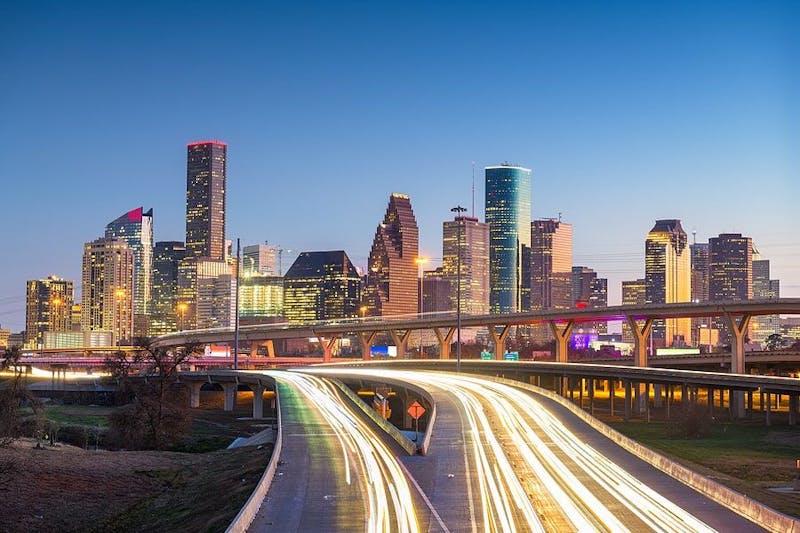Get a Free Consultation
2 minute response
24 hours a day, 7 Days a Week
Dedicated Trust Guss Intake Team

We all want to avoid car accidents, but some routes put you in more danger than others. Want to know if you’re taking some of the deadliest highways in Texas? Read on to see what we’ve discovered. The Texas Department of Transportation reports that 1 person is killed in a Texas car accident every two and a half hours. In 2019, the fatality rate of Texas motor vehicle accidents was 1.26 deaths per hundred million vehicle miles traveled. While this rate marked a 2.33% decrease from 2018, it’s still a preventable, senseless loss of life. If you or a loved one has been injured in a car accident, whether or not it occurred on one of the deadliest highways in Texas, we can help. Our Houston car accident lawyers have decades of experience helping accident victims from all over Texas put their lives back together. Contact us now for a free case evaluation.
It’s no secret: Texas is a sprawling state. It boasts 16 interstate highways and 45 U. S. highways. Of the Interstate Highway System’s 46,876 total miles, 3,233 of them are in Texas. Just last year, there were 1,261 fatal crashes on highways across Texas. But where are they most likely to occur? The Houston Chronicle published a detailed piece on the top 25 deadliest highways in Texas. To help us do the math and determine highly-concentrated accident sites, mile points and segment lengths were specified. Without further ado, the deadliest highway in Texas is…
In Houston, car accidents are everywhere. Last year there were an average of 188 auto accidents in Houston every day. In the aforementioned Houston Chronicle piece on top 25 deadliest stretches of highway in Texas, 7 of them were found right here in Houston. In fact, two separate segments of the 476-mile-long Highway 6 made it onto the list! Check it out:
So now you know. But what do the most dangerous roads in Texas have in common?
More people, more problems! Busy streets mean more chances for accidents. Farm-to-market roads passing through urban areas have the highest incidence of car accidents. FM 1960, which sits above central Houston and stretches 47 miles to Dayton, Texas, carries upwards of 60,000 vehicles per day. Every year, it is the location of about a dozen new car accident deaths. According to the Texas Department of Transportation, last year throughout Texas 75% of all accidents occurred in urban areas, while only a quarter occurred in rural areas. But there are exceptions to every rule. The relatively remote Route 285 — which runs through Pecos, Texas, and Carlsbad, New Mexico — is known colloquially as "Death Highway." As one Dallas Morning News article reports, 93 people died on Route 285 in just one year. What makes Route 285 so dangerous is its proximity to the Permian Basin, which contains the Mid-Continent Oil Field province. The booming oil industry in Texas means you'll see more 18-wheelers on the roads… and more 18-wheeler accidents. Multiple stretches of road passing through the nearby city of Odessa also pop up on the list. Clocking in at 120,000, Odessa’s population is relatively small, but its location in the Permian Basin could be a clue to the carnage: oil and gas companies might hire inexperienced truckers, and innocent drivers might pay the ultimate price. Additionally, commercial trucks ferrying hazardous materials are not always properly maintained. Small oversights can turn into big problems and potentially deadly semi truck accidents. While urban accidents are more likely to happen, rural accidents are more likely to be deadly when they do. Fatalities in traffic crashes in rural areas of the state accounted for more than half of the state’s traffic fatalities. This is largely due to the increased frequency of semi trucks on rural roads, as well as reduced signage, more animals in your path, and the ever-present temptation to speed through all those flat stretches of land.
There are plenty of things that can make you tighten that white-knuckle steering wheel grip we’re all familiar with, like intimidating 18-wheelers, irate drivers, sudden detours, and more. But fear not! By following the tips below, you can drive down the scariest roads in Texas with a bit more confidence.

As Texas highways claim more and more auto accident fatalities, the Texas Department of Public Safety is well aware of the problems. Speed limits in many areas are being lowered and more troopers are out monitoring heavily-trafficked areas. Still, Texas roads struggle to keep up with population growth and often fall into a state of disrepair. Despite our great state’s best efforts, risks remain on the roads. If you or your loved ones often travel along the deadliest highways in Texas, you need a team you can depend on in case of emergency. If you’ve been in a car accident, truck accident, or even a motorcycle accident, we’ve got you covered. If you’ve lost a loved one in a tragic Texas highway accident and would like to pursue a wrongful death claim, we can help. With decades of experience and a client-focused approach, our Houston car accident lawyers will treat you with the compassion and respect you deserve during this difficult time. Reach out now for a free consultation; our experts are available 24/7!
2 minute response
24 hours a day, 7 Days a Week
Dedicated Trust Guss Intake Team